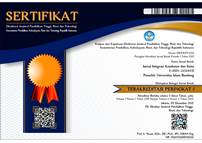Efektivitas Reality Therapy untuk Meningkatkan Self-Esteem pada Korban Bullying di Kota Bandung
Abstract
Abstrak
Bullying adalah perlakuan negatif yang dilakukan seseorang atau lebih dan terjadi secara berulang-ulang dari waktu ke waktu dan terdapat ketidakseimbangan kekuasaan atau kekuatan antara pelaku dan korban. Korban bullying berisiko memiliki self-esteem yang rendah ketika dewasa. Salah satu terapi untuk meningkatkan self-esteem adalah reality therapy. Terapi ini mengajarkan para korban untuk mengambil kontrol internal atas pemenuhan kebutuhan mereka. Hal ini sejalan dengan kebutuhan pada korban bullying untuk meningkatkan self-esteem karena dengan mengambil kontrol, evaluasi terhadap diri sendiri diharapkan dapat lebih positif. Tujuan penelitian ini adalah memperoleh data empirik apakah reality therapy efektif dalam meningkatkan self-esteem pada korban bullying di Kota Bandung. Desain penelitian yang digunakan adalah one group pretest-posttest design dengan jumlah subjek sebanyak 3 (tiga) orang yang dilakukan dari bulan Juni sampai Juli 2022. Data dianalisis menggunakan Wilcoxon Signed Rank Test untuk menguji perbedaan skor self-esteem sebelum dan sesudah terapi. Hasil penelitian menunjukkan bahwa reality therapy efektif dalam meningkatkan self-esteem pada korban bullying di Kota Bandung. Akan tetapi, peningkatan ini tidak signifikan dilihat dari nilai p = 0,109.
The Effectiveness of Reality Therapy to Increase the Self-Esteem of Bullying Victims in Bandung
Abstract
Bullying is a form of negative behavior done by a single person or more and it happened from time to time and there were inequality in power and authority between the perpetrator and the victim. Bullying victims are facing high-risk of low self-esteem as they grow up. One of the therapies that is proven to increase this self-esteem is Reality Therapy. It teaches the victims to take internal control for the fulfillment or their needs. This is in accordance with the victims’ need to increase their self-esteem because as they are able to take control of their lives, the evaluation towards themselves can be more positive. The purpose of this study was to obtain empirical data if Reality Therapy is effective to increase the self-esteem of bullying victims in Bandung. The data was analyzed with Wilcoxon Signed Rank Test to see the difference between pretest and posttest condition. The result showed that reality therapy is effective in increasing the self-esteem of bullying victims in Bandung. Although, the difference was not significance according to statistic with a p-value = 0.109.
Keywords
Full Text:
PDFReferences
KPAI. Data kasus pengaduan anak 2016–2020. Diunduh dari: https://bankdata.kpai.go.id/tabulasi-data/data-kasus-pengaduan-anak-2016-2020
Borualogo IS, Gumilang E. Kasus perundungan anak di Jawa Barat: temuan awal Children’s Worlds Survey di Indonesia. Psympathic: J Ilmiah Psikol. 2019:6(1):15–30. https://doi.org/10.15575/psy.v6i1.4439
Sulisrudatin N. Kasus bullying dalam kalangan pelajar: Suatu tinjauan kriminologi. J Ilmiah Hukum Dirgantara. 2015:5(2):57–70. https://doi.org/10.35968/jh.v5i2.109
Olweus D. School bullying: development and some important challenges. Annu Rev Clin Psychol. 2013;9:751–80. https://doi.org/10.1146/annurev-clinpsy-050212-185516.
Takizawa R, Maughan B, Arseneault L. Adult health outcomes of childhood bullying victimization: evidence from a five-decade longitudinal british birth cohort. Am J Psychiatry. 2014:171(7):777–84. https://doi.org/10.1176/appi.ajp.2014.13101401.
Blood GW, Blood IM. Long-term consequences of childhood bullying in adults who stutter: Social anxiety, fear of negative evaluation, self-esteem, and satisfaction with life. Journal of Fluency Disorders. 2016;50:72–84. https://doi.org/10.1016/j. jfl udis.2016.10.002.
Hepper E. Self-esteem. Encyclopedia of Mental Health. 2016;4:80–91. https://doi.org/10.1016/B978-0-12-397045-9.00076-8.
Acharya PB, Deshmukh RS. Self-esteem and academic achievement of secondary school students. International Referred Research Journal. 2012;3(2):1–9. https://doi.org/10.24256/ideas.v7i2.1052
Miller D, Moran T. Self-esteem: A Guide for Teachers, London: Sage; 2012.
Potard C. Self-Esteem Inventory (Coopersmith). 2017. https://doi.org/10.1007/978-3-319-28099-8_81-1.
Fennel MJ. Overcoming low self-esteem: a self-help guide using cognitive behavioral technique. London: Robinson; 1999.
Corey G. Reality therapy: theory and practice of counseling and psychotherapy, edisi ke-9. Belmont: Brooks/Cole, Cengage Learning; 2013.
Wubbolding RE. Counseling with reality therapy, edisi ke-2. London: Routledge; 2017.
Bradley EL. Choice theory and reality therapy: an overview. International Journal of Choice Theory & Reality Therapy. 2014;34(1):6–13.
Wubbolding RE. Reality therapy and self-evaluation: The key to client change. New York: Amer Counseling ASSN; 2018.
DOI: https://doi.org/10.29313/jiks.v4i2.10319
Refbacks
- There are currently no refbacks.
Jurnal Integrasi Kesehatan dan Sains is licensed under a Creative Commons Attribution-NonCommercial-ShareAlike 4.0 International License.







.png)
_(1).png)




















